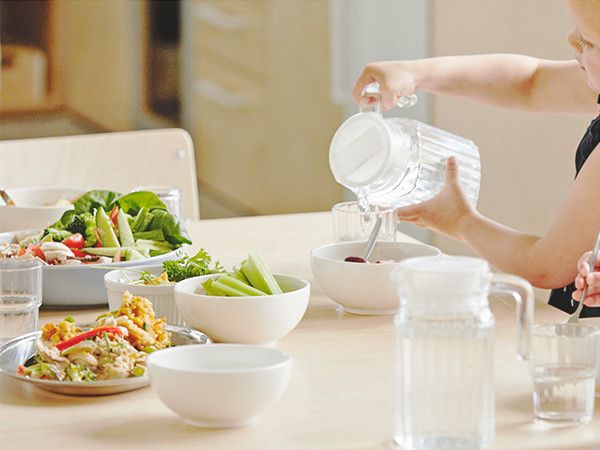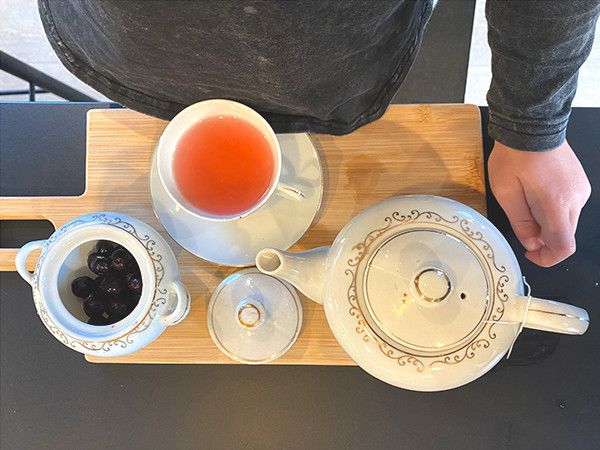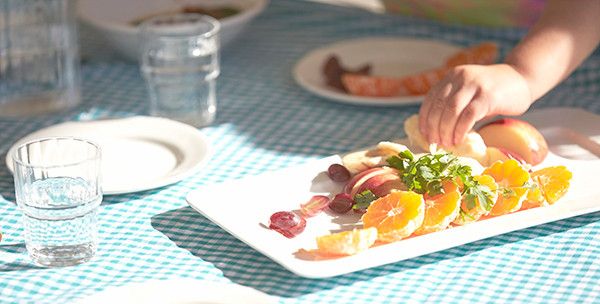
UK
The great food battle
20th July 2022
Share to Facebook
Written by Angela Bush
Bachelor of Education (ECE), Diploma of Nursing, Diploma of Teaching (ECE)

How would you feel if, while eating a meal, your fellow educators didn’t trust you to make your own choices about what to eat? Imagine your colleagues standing over you, watching what you get out of your lunch bag, dictating which items you could eat and when, and not even asking if you are hungry or full?
In every early year's curriculum around the world, there are statements that espouse the importance of providing opportunities for children to self-determine, make choices, and become increasingly capable. And we all genuinely believe children are capable of recognising and responding to their hunger cues and feelings of fullness, so why do we suddenly become dictators when food is served?
Let’s look at what’s holding us back from creating peaceful mealtimes, and how we can move towards empowering our children and bringing the joy back to the table.
It starts with you
Many of us will have poor food habits that began in our early years when we were coerced, made to feel guilty, forced to eat a certain amount, or at rigid times.
When faced with children playing games with food, refusing to eat instinctively kick in, and we find ourselves battling with children over food.
Subconsciously, we hold onto beliefs that don’t serve our children or us, including:
- “Children are starving in other parts of the world, so you should eat what you are given.”
- "You should eat everything on your plate. It is wasteful and ungrateful not to.”
- “We have worked hard to create this meal for you, and you will eat it!”
As educators, we not only have our own ingrained food beliefs but are also continuously traversing the tightrope between what parents want for their children, what our colleagues believe, our centre policies, and what we truly know to be good for children. It’s a balancing act and a half!
Over the years, I have seen a broad spectrum of controversial practices in group care environments at mealtimes, including;
- For children with a lunch box from home: You must eat one healthy or savoury thing first. Or you must eat your sandwich or yogurt first (subtext: everything else in your lunch box is less healthy or a “treat”).
- Educators take food away from a child’s lunch box because they deem it to be an unacceptable food choice made by the parent. This decision is often made with no consideration as to whether this parent has the money, time, or knowledge to provide healthy food options for their child or how this makes the child feel (Do I tell mum they took my food?).
- You must try everything. It doesn’t matter whether we know you like this food, when you last ate, or whether you are even hungry.
- Making a sandwich for one child at lunchtime because they refuse to eat the cooked meal on offer, and suddenly more children refuse the meal because they too would like a sandwich.
- Spoon-feeding babies and insisting they have “just one more mouthful” despite showing signs they have had enough.
Food battles are a common challenge in early years education that frequently creates angst and discord. These practices and behaviours are essentially underpinned by the belief that we know what is best for children in every part of the curriculum, rather than trusting children to recognise and respond to their hunger urges.
If empowerment, emotional wellbeing, and laying the foundations for lifelong habits are important to us, then it is time to stop the food battles at our tables.
Now don’t get me wrong, I’m not suggesting we say goodbye to standards and values around manners, not wasting food, not trying the food, or not coming to the table. I am not saying we should just roll out the food and let children take one look and walk away.
However, I think it’s important to take stock of how our personal agendas may lead us into unnecessary power struggles and battles over food and consider how we may contribute to children’s inner voices and early stages of their lifelong relationship with food.
Children in group care spend many hours at the meal table every week (three times a day minimum). The accumulation of the messages being heard and felt at the table impacts their self-belief, autonomy development, and ability to trust their instincts. We allow children to make choices in their play, so we must take the same approach when they come to the table.

Four valuable tools for low-stress mealtimes
Janet Lansbury (RIE Associate), in her book "No bad kids”, offers insight into how to avoid these battles respectfully and recognises children as capable, autonomous people. Janet suggests that to avoid food battles and to lay the foundation for a healthy relationship with food, we can:
- Lower our expectations of children at the table: Children can do many things but meeting our unrealistic expectations around food is not one. We only set ourselves up for disappointment to feel unappreciated.
- Temper our reactions and responses at mealtimes: Be aware of your subtext. Make eating solely about the relationship between the child and their tummy. So don't get excited when they eat well or disappointed when they don't eat well. Avoid coaxing, cajoling, or over-encouraging. These patterns set children up to search for approval around food and how much they eat. Remain neutral during mealtimes. Offer some choices in the food available, suggest children give it a try, and then drop it when they say no thank you. If your service has a well-balanced, nutritious menu, children will be presented with plenty of opportunities to try different, healthy foods.
- Give choices and small portions: Present less than what you think a child will eat, rather than load up their plate. Let children be the ones to ask for more. What the child eats must be in their control. Let them know that mealtime is over when they give you the signals they are done - slowing down, fiddling with food, throwing food, getting up from the table. Try not to get angry or overreact if children act out with food. Keep calm and say something like, "Hmmm, you are spitting. You must be telling me you are done." And follow through with this by taking the food away and gently helping the child to leave the table.
- Let go and trust children: If you have ruled out illness, it is best to trust that a child knows their own needs and when they have had enough. As Janet says, "children sometimes lose their appetites when they feel pressured around eating, but they do not go on hunger strikes."
Now I can hear the concerns rolling around in your head already…
- Won’t the child be hungry?
- What if they are hungry when it’s still an hour from the next mealtime?
- His mother will tell me that he is always starving when he gets home.
In my 30+ years of working with children, I have never seen a child willingly starve. I have seen plenty of children eat a minimal amount of food, i.e., my son only ate peanut butter toast, cereal, and bananas between the ages of two and three. But I can assure you, at 24 years old, his diet is healthy, varied, and open-minded.
For some children, choosing what to eat and how much to eat is one of the few places where they can exert power over the adults in their lives. The only time for concern is if the child is unwell or suffering from a medical condition, and in this case, follow directions from a health professional.
I always prefer to respect a child’s ability to choose what and how much they eat. If a child is still refusing to eat (and I know I have offered healthy food choices throughout the day and ensured water is freely available to drink), my first question is, “Does this child have a sound feeling of belonging and is settled and confident in their play?”. If the answer is yes, then this child has strong stamina and the ability to wait for food.

Let’s lead the way
Unfortunately, as early childhood educators, we do not have control over the habits parents have created at home, nor do we have the right to. For some children, the power dynamics they experience over food at home make it too much of a stretch for them to comfortably try new food habits in our care. Or they may just need time, patience, and support to learn we do not enter power battles over food at our centre.
Like all the other areas of child wellbeing, learning, and development, we can offer information and education to parents about food, nutrition, and developing autonomy, but it is not our place to judge.
Our early years' environments allow us to create a climate and routines to empower children as competent, so let's do that in a positive way and bring the joy back into our mealtimes.
Empty space, drag to resize
Have you seen our Members Club?

Cost-effective access to over 100 webinars, courses
and resources on demand.
and resources on demand.
*Special teams rates available
Empty space, drag to resize
People who enjoyed this blog also liked
Empty space, drag to resize
Webinars you may like
Empty space, drag to resize
Courses you may like
Empty space, drag to resize
Want to stay up to date with our blogs and professional learning content?
Thank you!
Empty space, drag to resize
Join our community
Subscribe to our mailing list for exciting updates and alerts when new resources, courses or webinars are added.
Thank you!
© ECE Learning Unlimited 2022. All Rights Reserved
